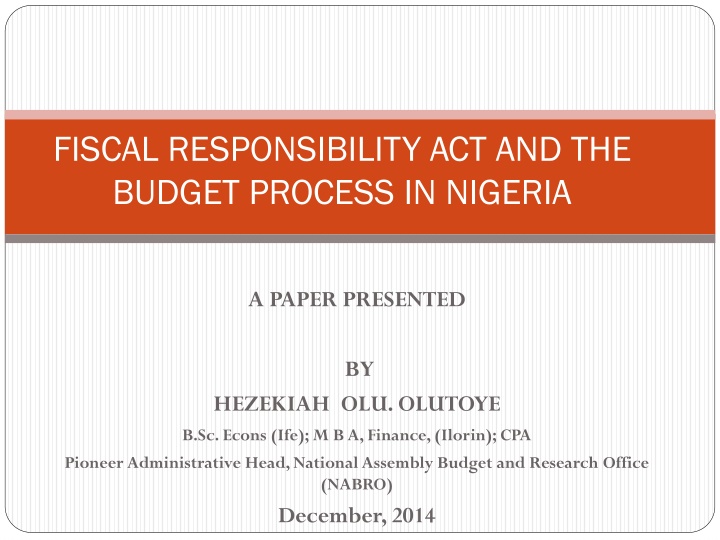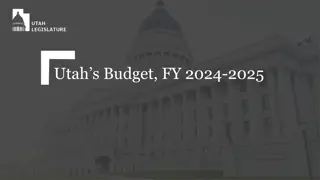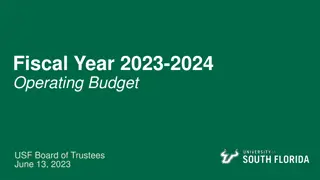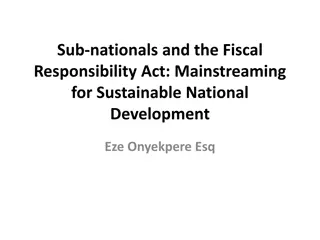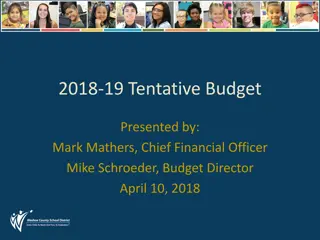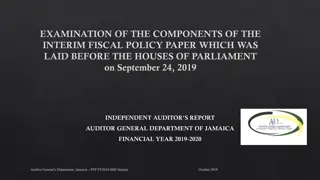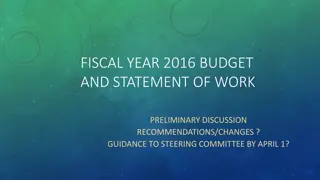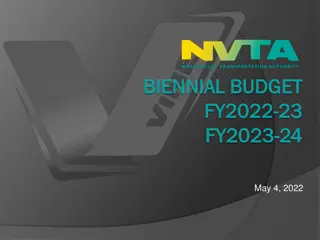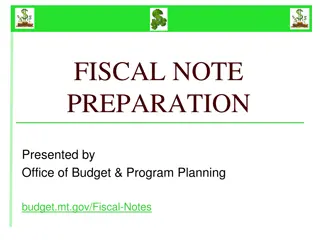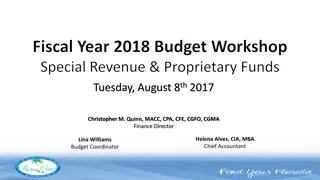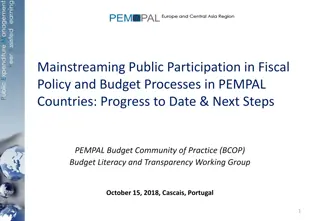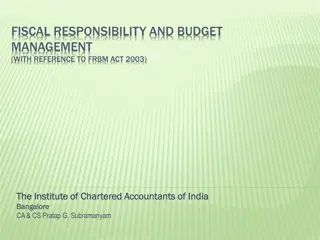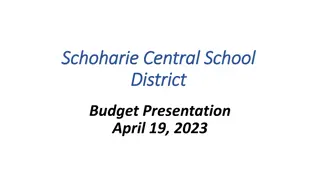Fiscal Responsibility Act and Budget Process in Nigeria
This paper delves into the Fiscal Responsibility Act of 2007 in Nigeria, focusing on its objectives, implementation challenges, and the role of the Fiscal Responsibility Commission in enhancing fiscal management and transparency. It explores the importance of prudent resource management, economic stability, and accountability within the budgeting process.
Download Presentation

Please find below an Image/Link to download the presentation.
The content on the website is provided AS IS for your information and personal use only. It may not be sold, licensed, or shared on other websites without obtaining consent from the author.If you encounter any issues during the download, it is possible that the publisher has removed the file from their server.
You are allowed to download the files provided on this website for personal or commercial use, subject to the condition that they are used lawfully. All files are the property of their respective owners.
The content on the website is provided AS IS for your information and personal use only. It may not be sold, licensed, or shared on other websites without obtaining consent from the author.
E N D
Presentation Transcript
FISCAL RESPONSIBILITY ACT AND THE BUDGET PROCESS IN NIGERIA A PAPER PRESENTED BY HEZEKIAH OLU. OLUTOYE B.Sc. Econs (Ife); M B A, Finance, (Ilorin); CPA Pioneer Administrative Head, National Assembly Budget and Research Office (NABRO) December, 2014
OBJECTIVE OF THE PAPER At the end of this discussion, the participants will understands the purpose and intent of the Fiscal Responsibility Act 2007. They will be able to appreciate the contents, purpose and intent of the Act They will be able to see the intended role of the Act and the Fiscal Responsibility Commission s expected role in budgeting process. They will be able to see the lapses in our budgeting system as a result of the poor implementation of the Act and non domestication of it by the States.
Fiscal Responsibility Act The law is meant to provide for prudent management of the nation s resources, ensure long-term macro-economic stability of the national economy, secure greater accountability and transparency in fiscal operations within a medium term fiscal policy framework. It is also to provide for the establishment of the Fiscal Responsibility Commission to ensure the promotion and enforcement of the nation s economic objectives. The Fiscal Responsibility Bill was initiated to ensure the coordination of national economic policy between various tiers of government, and enable monitoring of agencies that are off-budget but whose activities have significant impact on fiscal policies. The law was passed in 2007 but it was not until 2008 that the chairman and members of the commission were appointed, under the leadership of AlhajiAliyu JibrilYelwa.
DUTIES OF THE COMMISSION Monitor and enforce the provisions of the Act and by so doing, promote the economic objectives contained in section 16 of the Constitution; Disseminate such standard practices including international good practice that will result in greater efficiency in the allocation and management of public expenditure, revenue collection, debt control and transparency in fiscal matters; Undertake fiscal and financial studies, analysis and diagnosis and disseminate the result to the general public; Make rules for carrying out its functions under this Act; and Perform any other function consistent with the promotion of the objectives of this Act.
SECTION 16 OF THE CONSTITUTION SECTION 16 OF THE CONSTITUTION The State shall, within the context of the ideals and objectives for which provisions are made in this Constitution. (a) harness the resources of the nation and promote national prosperity and an efficient, a dynamic and self-reliant economy; (b) control the national economy in such manner as to secure the maximum welfare, freedom and happiness of every citizen on the basis of social justice and equality of status and opportunity; (c) without prejudice to its right to operate or participate in areas of the economy, other than the major sectors of the economy, manage and operate the major sectors of the economy; (d) without prejudice to the right of any person to participate in areas of the economy within the major sector of the economy, protect the right of every citizen to engage in any economic activities outside the major sectors of the economy.
SECTION 16 OF THE CONSTITUTION (Contd) (3) A body shall be set up by an Act of the National Assembly which shall have power; (a) to review, from time to time, the ownership and control of business enterprises operating in Nigeria and make recommendations to the President on same; and (b) to administer any law for the regulation of the ownership and control of such enterprises. Thus, Fiscal Responsibility Act as well as the Fiscal Responsibility Commission were aimed at addressing issues raised in this section .
MANDATES OF THE LAW 1. The Federal Government after consultation with the States shall prepared and lay before the National Assembly, for their consideration a Medium-Term Expenditure Framework for the next three financial years 2. The frame-work so laid shall be considered for approval with such modifications if any, as the National Assembly finds appropriate by a resolution of each House of the NationalAssembly. 3. The Medium-Term Expenditure Framework shall contain: (a) a Macro-economic Framework setting out the macro-economic projections, for the next three financial years, the underlying assumptions for those projections and an evaluation and analysis of the macroeconomic projects for the preceding three financial years; (b) a Fiscal Strategy Paper setting out: (i) the Federal Government s medium-term financial objectives,
MANDATES OF THE LAW (contd) (ii) the policies of the Federal Government for the medium-term relating to taxation, recurrent (non-debt) expenditure, debt expenditure, capital expenditure, expenditure, borrowings and other liabilities, lending and investment, (iii) the strategic, economic, social and developmental priorities of the Federal Government for the next three financial years, (iv) an explanation of how the financial objectives, strategic, economic, social and developmental priorities and fiscal measures set out pursuant to subparagraphs (i), (ii) and (iii) of this paragraph above (c) an expenditure and revenue framework setting out: (i) estimates of aggregate revenues for the Federation for each financial year in the next three financial years, based on the predetermined Commodity Reference Price adopted and tax revenue projections,
MANDATES OF THE LAW (contd) (ii) aggregate expenditure projection for the Federation for each financial year in the next three financial years, (iii) aggregate tax expenditure projection for the Federation for each financial year in the next three financial years, and (iv) minimum capital expenditure floor for the federation for each financial year in the next three financial years: Other provisions include that:: The aggregate expenditure and the aggregate amount appropriated by the National Assembly for each financial year shall not be more than the estimated aggregate revenue plus a deficit, not exceeding three per cent of the Estimated Gross Domestic Product or any sustainable percentage as may be determined by the National Assembly for each financial year except in time of war or threat to national security
STAKEHOLDERS IN MTEF The Minister shall be responsible for the preparation of the Medium- Term Expenditure Framework. (2) In preparing the draft Medium-Term Framework, the Minster: (a) may hold public consultation, on the Macro-economic Framework, the Fiscal Strategy Paper, the Revenue and Expenditure Framework, the strategic, economic, social and developmental priorities of government, and such other matters as the Minister deems necessary: Provided that, such consultations shall be open to the public, the press and any citizen or authorized representatives of any organization, group of citizens, who may attend and be heard on any subject matter properly in view;
STAKEHOLDERS IN MTEF (contd) (b) shall seek inputs from the (i) National Planning Commission, (ii) Joint Planning Board, 9(iii) National Commission on Development Planning, (iv) National Economic Commission, (v) National Assembly, (vi) Central Bank of Nigeria, (vii) National Bureau of Statistics, (viii) Revenue Mobilisation Allocation and Fiscal Commission, (ix) any other relevant statutory body as the Minister may determine, and consider and reflect their contributions in the document.
TIMELINESS AND COMPREHENSIVENESS OF THE BUDGET The law provides for the timely passage of the budget by requesting the Minister to present the MTEF &FSP to the Federal Executive Council before the end of the second quarter of each financial year and must be approved by National Assembly before the presentation of the annual budget estimates The MTEF shall be the basis for the preparation of the annual budget . Government corporations shall submit their budget estimates and proposed operating surplus to the Minister of finance not later than August and shall form part of the draft budget submitted to the parliament. Operating surplus shall be paid into the consolidated revenue fund of Government and each of them shall establish a general reserve fund which shall be 1/5thof its operating surplus for the year. Each MDA is expected to submit its revenue profile for the coming year 30 days before the deadline for the submission of its budget proposals, place, at the disposal of the National Assembly
BUDGET PREPARATION Fiscal Target Appendices must be stated in clear terms Government owned Corporation must submit their audited report at specified period of the year In the execution of budget, the law provides for an Annual Cash Plan to be prepared by the Accountant General setting out projected monthly cash flows and shall be revised as at when necessary. A Disbursement Schedule derived from the Annual Cash Plan for the purposes of implementing the Appropriation Act shall be drawn by the minister not later than 30 days after the passage of the Act.
BUDGET EXECUTION AND OVERSIGHT Budget must be implemented as passed and virement must be approved by the parliament and can only be submitted by the Minister of Finance The Minister of Finance, through the Budget Office of the Federation, shall monitor and evaluate the implementation of the Annual Budget, assess the attainment of fiscal targets and report thereon on a quarterly basis to the Fiscal Responsibility Council and the Joint Finance Committee of the National Assembly. Such report must be published in the mass and electronic media and on Ministry of Finance website not later than 30 days after the end of each quarter. Management of government savings are specified in such a way to demonstrate transparency
BUDGET IMPLEMENTATION All contracts with regards to the execution of annual budget; shall comply with the rules and guidelines on: (a) procurement and award of contracts; and (b) due process and certification of contract. Any violation of these requirements above shall be an offence. This is the genesis of the Procurement Act and the establishment of Bureau of public Procurement Borrowings can only be made for capital expenditure and must be approved by the parliament What constitute a state debt and its management are clearly spelt out by the law Central and Commercial Bank control and management are also included in the act to ensure prudent financial flow in the interest of the economy
TRANSPARENCY & ACCOUNTABILITY Government shall ensure that its fiscal and financial affairs are conducted in a transparent manner and accordingly ensure full and timely disclosure and wide publication of all transactions and decisions involving public revenues and expenditures and their implications for its finances. The National Assembly shall ensure transparency during the preparation and discussion of the Medium-Term Expenditure Framework, Annual Budget and the Appropriate Bill The Federal Government through the Accountant General shall publish their audited accounts not later than six months following the end of the financial year The Budget Office shall within 30 days after the end of each quarter, publish a summarized report on budget execution in such form as may be prescribed by the Fiscal Responsibility Commission and not later than 6 months after the end of the financial year, a consolidated budget execution report to the National Assembly.
HAS THE FRA & FRC ACHIEVED THEIR GOALS? From the above, we can see that the Fiscal Responsibility Act (FRA) and the Fiscal Responsibility Commission were targeted at the budget cycle so as to ensure financial prudency, transparency and best practice. Unfortunately , these have eluded us in Nigeria. This is due to corrupt practices by all stakeholders at all levels Fragrant or tactical disobedience of the Act at all levels Inactiveness of the Commission to being alive to his responsibility. Cases of misappropriation of public funds were not queried by the FRC whose primary responsibility it is to carry out such activities Other countries of the world such as India and Brazil have enacted Fiscal Responsibility laws to strengthen their fiscal institutions and establish a broad framework of fiscal planning successfully, and all their States have replicated the Act within a short time. Despite the clause that States and Local Governments may adopt the provisions of this Part with such modifications as may be appropriate and necessary our states are still dragging their feet in adopting the act
HAS THE FRA & FRC ACHIEVED THEIR GOALS? The FRA is meant to positively improve the management of public debt both at the Federal and State Government levels, but the reverse is the case in Nigeria According to El-Rufai, the structure, implementation process and weak leadership are encumbrances to the FRC living up to its maximum potentials. The authority of the commission in ensuring fiscal responsibility is neither acknowledged nor adhered to. The Fiscal Responsibility Commission was set up to stem the high tide of corruption, but sadly, corruption has become the single largest contributor to Nigeria s underdevelopment, infrastructure deficits and mass poverty
CONCLUSION The Fiscal Responsibility Commission s mission on paper is to reform the management of Nigeria s public finances through regular monitoring of government financial activities, uncompromising investigation and public reporting backed by a firm commitment to enforcement under the rule of law. By so doing, promote economic objectives contained in section 16 of the Nigerian Constitutions , but the agency saddled with these onerous tasks of tackling the challenges of corruption has conveniently gone to sleep and become a toothless bull dog. To tackle the widespread cases of fiscal indiscipline, corruption and inefficiency in the running of government business, agencies like the fiscal responsibility commission must say no to the business-as-usual tendency of covering up for corrupt officials and become vibrant anti-graft institutions.
. Thank you!!!
